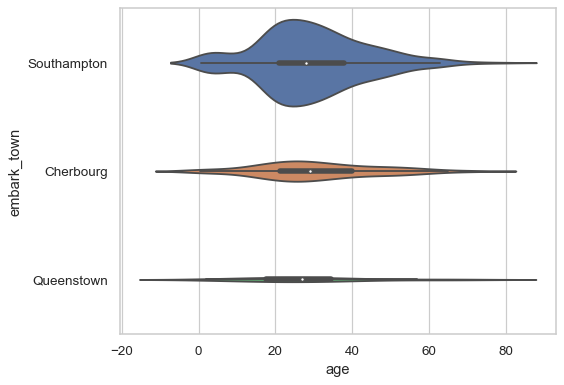seaborn.violinplot#
- seaborn.violinplot(data=None, *, x=None, y=None, hue=None, order=None, hue_order=None, bw='scott', cut=2, scale='area', scale_hue=True, gridsize=100, width=0.8, inner='box', split=False, dodge=True, orient=None, linewidth=None, color=None, palette=None, saturation=0.75, ax=None, **kwargs)#
Draw a combination of boxplot and kernel density estimate.
A violin plot plays a similar role as a box and whisker plot. It shows the distribution of quantitative data across several levels of one (or more) categorical variables such that those distributions can be compared. Unlike a box plot, in which all of the plot components correspond to actual datapoints, the violin plot features a kernel density estimation of the underlying distribution.
This can be an effective and attractive way to show multiple distributions of data at once, but keep in mind that the estimation procedure is influenced by the sample size, and violins for relatively small samples might look misleadingly smooth.
Note
This function always treats one of the variables as categorical and draws data at ordinal positions (0, 1, … n) on the relevant axis, even when the data has a numeric or date type.
See the tutorial for more information.
- Parameters:
- dataDataFrame, array, or list of arrays, optional
Dataset for plotting. If
xandyare absent, this is interpreted as wide-form. Otherwise it is expected to be long-form.- x, y, huenames of variables in
dataor vector data, optional Inputs for plotting long-form data. See examples for interpretation.
- order, hue_orderlists of strings, optional
Order to plot the categorical levels in; otherwise the levels are inferred from the data objects.
- bw{‘scott’, ‘silverman’, float}, optional
Either the name of a reference rule or the scale factor to use when computing the kernel bandwidth. The actual kernel size will be determined by multiplying the scale factor by the standard deviation of the data within each bin.
- cutfloat, optional
Distance, in units of bandwidth size, to extend the density past the extreme datapoints. Set to 0 to limit the violin range within the range of the observed data (i.e., to have the same effect as
trim=Trueinggplot.- scale{“area”, “count”, “width”}, optional
The method used to scale the width of each violin. If
area, each violin will have the same area. Ifcount, the width of the violins will be scaled by the number of observations in that bin. Ifwidth, each violin will have the same width.- scale_huebool, optional
When nesting violins using a
huevariable, this parameter determines whether the scaling is computed within each level of the major grouping variable (scale_hue=True) or across all the violins on the plot (scale_hue=False).- gridsizeint, optional
Number of points in the discrete grid used to compute the kernel density estimate.
- widthfloat, optional
Width of a full element when not using hue nesting, or width of all the elements for one level of the major grouping variable.
- inner{“box”, “quartile”, “point”, “stick”, None}, optional
Representation of the datapoints in the violin interior. If
box, draw a miniature boxplot. Ifquartiles, draw the quartiles of the distribution. Ifpointorstick, show each underlying datapoint. UsingNonewill draw unadorned violins.- splitbool, optional
When using hue nesting with a variable that takes two levels, setting
splitto True will draw half of a violin for each level. This can make it easier to directly compare the distributions.- dodgebool, optional
When hue nesting is used, whether elements should be shifted along the categorical axis.
- orient“v” | “h”, optional
Orientation of the plot (vertical or horizontal). This is usually inferred based on the type of the input variables, but it can be used to resolve ambiguity when both
xandyare numeric or when plotting wide-form data.- linewidthfloat, optional
Width of the gray lines that frame the plot elements.
- colormatplotlib color, optional
Single color for the elements in the plot.
- palettepalette name, list, or dict
Colors to use for the different levels of the
huevariable. Should be something that can be interpreted bycolor_palette(), or a dictionary mapping hue levels to matplotlib colors.- saturationfloat, optional
Proportion of the original saturation to draw colors at. Large patches often look better with slightly desaturated colors, but set this to
1if you want the plot colors to perfectly match the input color.- axmatplotlib Axes, optional
Axes object to draw the plot onto, otherwise uses the current Axes.
- Returns:
- axmatplotlib Axes
Returns the Axes object with the plot drawn onto it.
See also
boxplotA traditional box-and-whisker plot with a similar API.
stripplotA scatterplot where one variable is categorical. Can be used in conjunction with other plots to show each observation.
swarmplotA categorical scatterplot where the points do not overlap. Can be used with other plots to show each observation.
catplotCombine a categorical plot with a
FacetGrid.
Examples
Draw a single horizontal boxplot, assigning the data directly to the coordinate variable:
df = sns.load_dataset("titanic") sns.violinplot(x=df["age"])
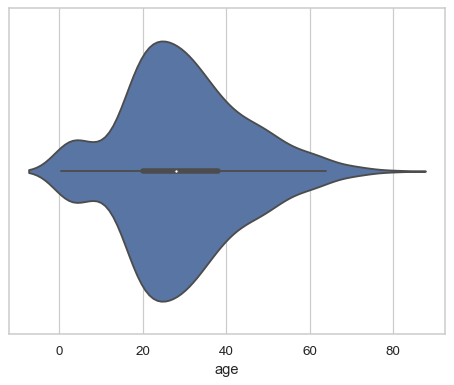
Group by a categorical variable, referencing columns in a dataframe:
sns.violinplot(data=df, x="age", y="class")
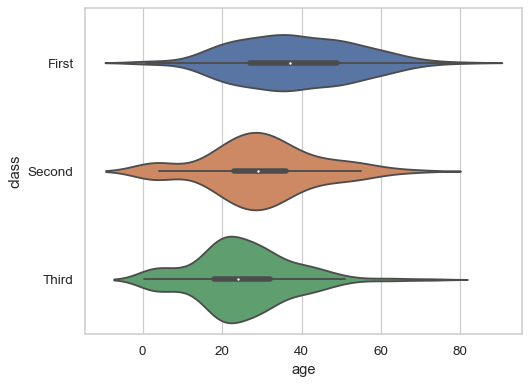
Draw vertical violins, grouped by two variables:
sns.violinplot(data=df, x="class", y="age", hue="alive")
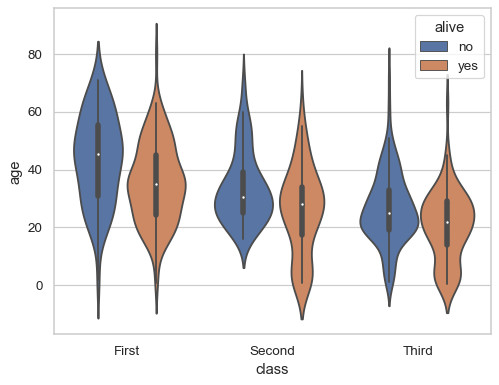
Draw split violins to take up less space:
sns.violinplot(data=df, x="deck", y="age", hue="alive", split=True)
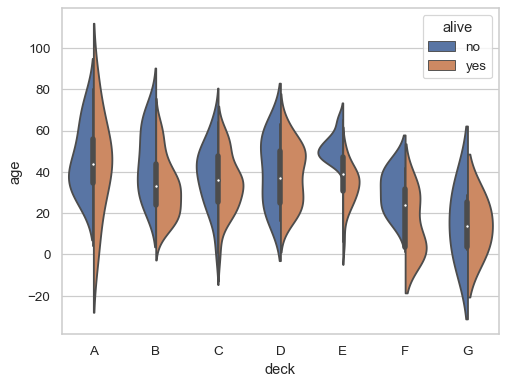
Prevent the density from smoothing beyond the limits of the data:
sns.violinplot(data=df, x="age", y="alive", cut=0)
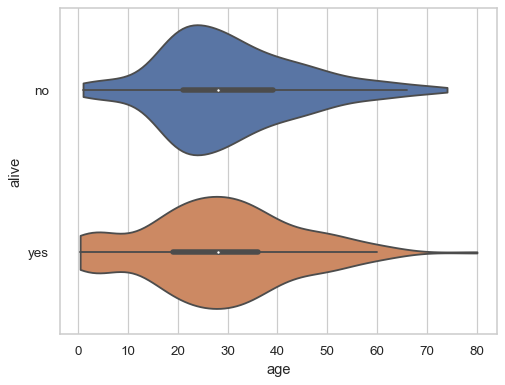
Use a narrower bandwidth to reduce the amount of smoothing:
sns.violinplot(data=df, x="age", y="alive", bw=.15)
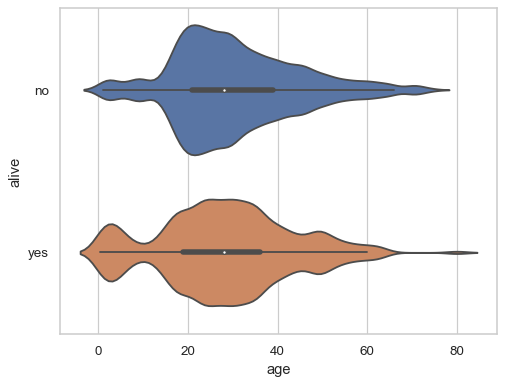
Represent every observation inside the distribution
sns.violinplot(data=df, x="age", y="embark_town", inner="stick")
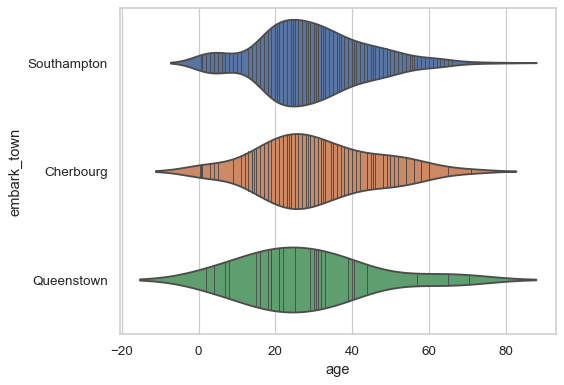
Use a different scaling rule for normalizing the density:
sns.violinplot(data=df, x="age", y="embark_town", scale="count")
